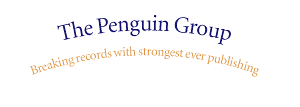


Penguin is the most famous name in book publishing and a leader in all of the world's major English language markets. We publish some 3,500 books every year, for adults and children, in fiction and non-fiction, from timeless classics to the hottest bestsellers. |
|||||||||||||||||||||||||||||||||||||||||||||||||||||||||||||||||||||||||||||||||
 |
|||||||||||||||||||||||||||||||||||||||||||||||||||||||||||||||||||||||||||||||||
|
|||||||||||||||||||||||||||||||||||||||||||||||||||||||||||||||||||||||||||||||||
| Note At the beginning of 2003 we transferred our Alpha consumer technology publishing business from Pearson Education’s Professional division to Penguin. Our calculation of Penguin’s underlying growth includes Alpha for both 2002 and 2003. | |||||||||||||||||||||||||||||||||||||||||||||||||||||||||||||||||||||||||||||||||
 |
Penguin increased revenues and profits by 2%. In the US, our largest market, accounting for around two-thirds of sales, our best ever schedule of new titles enabled Penguin to grow ahead of the industry despite tough conditions for backlist publishing. In the UK our backlist performed well, helped by the relaunch of Penguin Classics and the BBC's The Big Read. Penguin's best-selling books included: |
||||||||||||||||||||||||||||||||||||||||||||||||||||||||||||||||||||||||||||||||
| John Makinson, Chairman and Chief executive, Penguin Group |
|||||||||||||||||||||||||||||||||||||||||||||||||||||||||||||||||||||||||||||||||
| > Sue Monk Kidd's debut novel The Secret Life of Bees (2.3 million copies sold) > John Steinbeck's East of Eden (1.5 million) > Al Franken's Lies and the Lying Liars Who Tell Them (1.1 million) > Scott Berg's Kate Remembered (0.5 million) > Paul Burrell's A Royal Duty (0.9 million) > Madonna's The English Roses and Mr Peabody's Apples (1.2 million) and > Michael Moore's Stupid White Men (0.8 million). Dorling Kindersley faced a tough backlist market but benefited from three major new titles: > America 24/7 > Tom Peters' Re-Imagine! and > e-Encyclopaedia published in association with Google™. We increased spending on authors' advances as we invested in a number of new imprints including Portfolio (business books), Gotham (non-fiction), and The Penguin Press (non-fiction), which has already signed over 90 authors, including Alexandra Fuller, Ron Chernow and John Berendt. We signed new multi-book deals with a number of our most successful authors including Catherine Coulter and Nora Roberts, whose books have spent a total of 71 weeks at number one on the New York Times bestseller list. |
|||||||||||||||||||||||||||||||||||||||||||||||||||||||||||||||||||||||||||||||||
| In the year ahead we will also be investing in channel initiatives to build the Penguin and DK brands and to reach new consumers. These include Penguin TV, which will commission non-fiction and children's programmes based on DK and Penguin books, and a pilot direct selling programme in the US. Pearson is the world's largest book publisher and last year we continued to integrate our book publishing operations around the world. In Australia and Canada, the first two markets where we combined Penguin and Pearson Education into one company, profits were up 17% and 12% respectively. In the UK, we have moved the two businesses to a single shared warehousing and distribution centre and in the US we have begun to consolidate central functions. The costs of these integration moves were absorbed in the operating profits of Pearson Education and Penguin in 2002 and 2003, and we continue to expect them to deliver some £20m of annual cost savings from 2005. |
|||||||||||||||||||||||||||||||||||||||||||||||||||||||||||||||||||||||||||||||||